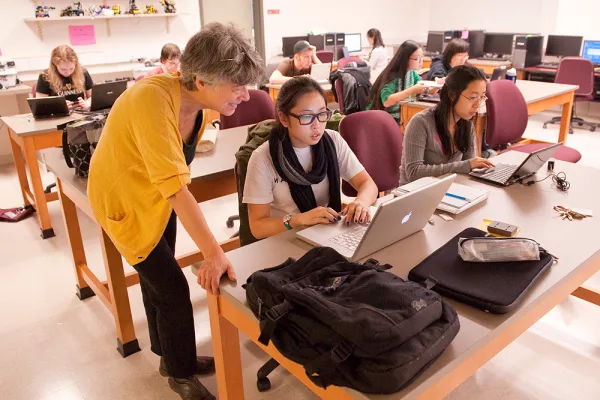Smith Awarded STEM Grant to Boost Student Interest in Science, Technology Fields
Research & Inquiry

Published June 19, 2014
Smith College has been awarded a $300,000 three-year grant for a pilot teaching program aimed at increasing the number of women and underrepresented minorities who succeed in science and technology fields.
The Association of American Colleges and Universities (AAC&U) announced June 19 that Smith was one of 14 colleges and universities nationwide to receive a full grant award under the organization’s new initiative, Teaching to Increase Diversity and Equity in STEM (TIDES). STEM is short for science, technology, engineering and math.
Another six schools were selected to participate in training provided by the program.
Smith computer science professor Dominique Thiébaut, the principal investigator for the grant, said the idea arose when he was looking for new ways to engage students in his introductory programming class earlier this year.
To do so, Thiébaut reached out to a colleague in the humanities, French studies professor Hélène Visentin, inviting her to class to present a digital map of Paris her students had used to enhance their exploration of French literature.
From there, Thiébaut’s students wrote programs for their own digital map—a project he said gave them “a look at how to apply programming skills” to research and study in other fields.
Supporting such strategies for improving STEM teaching in higher education is the goal of the new $4.9 million TIDES initiative, funded by the Helmsley Trust, according to the AAC&U.
The organization said Smith was selected as a TIDES school because it showed a “high level of institutional readiness” and “innovation in linking computer/information sciences with other STEM and non-STEM courses.”
Smith, home to the nation’s first engineering program for women, has other efforts underway to support STEM education.
In January, President Kathleen McCartney announced a commitment to enroll 10 low-income students each year who seek majors and careers in STEM fields. Smith will welcome its first STEM “posse,” supported by the Posse Foundation and drawn from students in public high schools in New York City, in 2015.
Thiébaut said the new TIDES grant will be used to incorporate liberal arts modules into introductory science classes at Smith to help engage more students early on in STEM learning—and keep them engaged.
While the number of Smith students taking introductory courses in computer science has doubled over the past decade to more than 200 in 2013–14, the number of students actually majoring in that field each year fluctuates and is generally fewer than 20. The percentage of underrepresented minorities who choose computer science as a major has remained slightly lower than for the college as a whole.
The pilot program centers on five courses in Smith’s three participating departments where students have their first contact with computer programming. Through guest lectures, videos and other classroom resources, students in those courses will explore how computer science can be applied to other fields, Thiébaut said.
For example, Sarah Moore, an assistant professor of engineering at Smith, said she plans to use a module in global health in her Engineering for Everyone class this fall to increase students’ understanding of engineering design.
“We’re going to ask students to design ways to address some of the big, messy problems in global health,” said Moore, who is co-principal investigator for the TIDES grant. “Retention in STEM fields is improved when students know why they are learning what they are learning.”
Visentin of the French studies department, said her experience as a guest humanities lecturer in Thiébaut’s computer science class this spring benefited her own teaching.
“The students asked me a lot of very smart questions,” she said. “They gave me ideas for how to develop our mapping project and what I can do with my students.”
The AAC&U will offer training sessions for Smith faculty, and the grant will support training for a dozen students who will act as peer mentors for classmates encountering computer science for the first time.
Course materials will also be provided to interested faculty through an online wiki that will be linked to the computer science department website.
Although the STEM grant focuses on the sciences, Thiébaut said lessons learned from the pilot program will be useful to other academic disciplines.
“The trend we see is that every department on campus will be needing to use computer technology and programming,” he said. “We want to use this model as fully as we can.”
Associate Provost Joseph O’Rourke is serving as administrator for Smith’s TIDES grant. Other faculty members on the team are Eitan Mendelowitz, assistant professor of computer science, and Benjamin Baumer, visiting assistant professor in mathematics and statistics.
Ileana Streinu, Charles N. Clarke Professor of Computer Science, assists a student.